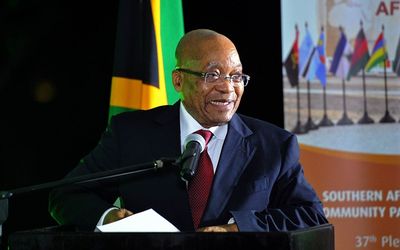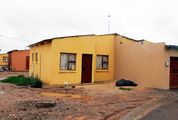Private security law will harm our land
by Steve Conradie,
2015-09-17 06:15:15.0
ANSWERING a question about the status of the Private Security Industry Regulation Amendment Act last week, President Jacob Zuma said the growth of private security companies in SA had created a private force.
The act is with the president for his signature. He may return to Parliament for review.
The act contains a clause (Section 20) that has the potential to do enormous harm to our country. If he signs it, the act will force multinational private security companies such as ADT, Chubb, Securitas and G4S, as well as security equipment manufacturers, distributors, installers and suppliers such as Panasonic, Sony, FedEx, Bosch, Honeywell, Motorola, Siemens and many other international investors, to relinquish 51% or more of their local shareholding.
The reason given for the expropriation clause is that the companies may pose a risk to national security. There simply is no basis for this notion. First, there are already laws in place that prohibit any company in the private security sector from employing foreigners.
To be registered as a private security provider, a company must pass the rigorous compliance tests set out by the industry regulator. Among the requirements is that all staff must be South African citizens or permanent residents. Every person working at these companies, from guards to directors, are South African citizens or permanent residents. As such, it is preposterous to think SA’s own people would be a threat to its own government or country.
Second, no company in the private security sector is allowed, by law, to participate in any mercenary or intelligence-gathering activities.
Companies such as ADT, Chubb, G4S and Securitas are purely mandated to protect customers and their properties and assets. They are listed on global stock markets and have to adhere to the strictest governance and compliance rules.
Further, according to the industry regulator, there are about 455,000 private security officers in SA. Of this total, less than 10% work for the multinational companies.
We have often heard that SA has the largest private security industry in the world. It does not — we are in seventh place. We have also heard that the ratio of police to private security guards is astronomically high. This is also not correct — there are 2.25 private security guards for every police officer. This ratio isn’t much different from the US (2.26) or Australia (2.19).
As representatives of the sector, we must acknowledge that there are companies that do not comply with the law or the industry regulator. They may be employing people from other countries, but these are not multinational companies, they are South African-owned firms.
Enforcement of the law coupled with a serious effort by government, the regulator and the sector can fix this problem.
As the industry body, we are committed to constructive dialogue with government to clarify misperceptions and to find solutions to improving governance and compliance within the sector.
Limiting foreign ownership through expropriation of multi-national companies that are legal, compliant and operate within the law is not the answer.
SA is working hard to ensure that it is able to attract much-needed foreign direct investment.
Section 20 of an otherwise excellent piece of legislation undermines this by sending a message to our trade partners and foreign and local investors across industries that property rights and assets are not safe from expropriation.
We are here to protect people and assets, be they citizens, companies, cash in transit or shopping malls. Every day, our employees join the South African Police Service in the battle against crime for the benefit of all South Africans. We are a part of the solution, not the problem.
We urge President Zuma to return this act to Parliament for the removal of Section 20.
• Conradie is CEO of the Security Industry Alliance

President Jacob Zuma may send the Private Security Industry Regulation Amendment Act back to Parliament for review. Picture: SIYABULELA DUDA
ANSWERING a question about the status of the Private Security Industry Regulation Amendment Act last week, President Jacob Zuma said the growth of private security companies in SA had created a private force.
The act is with the president for his signature. He may return to Parliament for review.
The act contains a clause (Section 20) that has the potential to do enormous harm to our country. If he signs it, the act will force multinational private security companies such as ADT, Chubb, Securitas and G4S, as well as security equipment manufacturers, distributors, installers and suppliers such as Panasonic, Sony, FedEx, Bosch, Honeywell, Motorola, Siemens and many other international investors, to relinquish 51% or more of their local shareholding.
The reason given for the expropriation clause is that the companies may pose a risk to national security. There simply is no basis for this notion. First, there are already laws in place that prohibit any company in the private security sector from employing foreigners.
To be registered as a private security provider, a company must pass the rigorous compliance tests set out by the industry regulator. Among the requirements is that all staff must be South African citizens or permanent residents. Every person working at these companies, from guards to directors, are South African citizens or permanent residents. As such, it is preposterous to think SA’s own people would be a threat to its own government or country.
Second, no company in the private security sector is allowed, by law, to participate in any mercenary or intelligence-gathering activities.
Companies such as ADT, Chubb, G4S and Securitas are purely mandated to protect customers and their properties and assets. They are listed on global stock markets and have to adhere to the strictest governance and compliance rules.
Further, according to the industry regulator, there are about 455,000 private security officers in SA. Of this total, less than 10% work for the multinational companies.
We have often heard that SA has the largest private security industry in the world. It does not — we are in seventh place. We have also heard that the ratio of police to private security guards is astronomically high. This is also not correct — there are 2.25 private security guards for every police officer. This ratio isn’t much different from the US (2.26) or Australia (2.19).
As representatives of the sector, we must acknowledge that there are companies that do not comply with the law or the industry regulator. They may be employing people from other countries, but these are not multinational companies, they are South African-owned firms.
Enforcement of the law coupled with a serious effort by government, the regulator and the sector can fix this problem.
As the industry body, we are committed to constructive dialogue with government to clarify misperceptions and to find solutions to improving governance and compliance within the sector.
Limiting foreign ownership through expropriation of multi-national companies that are legal, compliant and operate within the law is not the answer.
SA is working hard to ensure that it is able to attract much-needed foreign direct investment.
Section 20 of an otherwise excellent piece of legislation undermines this by sending a message to our trade partners and foreign and local investors across industries that property rights and assets are not safe from expropriation.
We are here to protect people and assets, be they citizens, companies, cash in transit or shopping malls. Every day, our employees join the South African Police Service in the battle against crime for the benefit of all South Africans. We are a part of the solution, not the problem.
We urge President Zuma to return this act to Parliament for the removal of Section 20.
• Conradie is CEO of the Security Industry Alliance



























